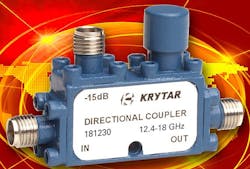Directional coupler for EW, radar, SATCOM, and antenna beam forming introduced by KRYTAR
The directional coupler operates in the frequency range of 12.4 to 18.0 GHz offering nominal coupling of 30 dB in a compact package for applications that require external leveling, precise monitoring, signal mixing, or swept transmission and reflection measurements.
The model 181230 delivers 30 dB (plus-or-minus 1.0 dB) of nominal coupling (with respect to output) and frequency sensitivity of plus-or-minus 0.7 dB. Directivity is more than 15 dB.
The coupler exhibits insertion loss of less than 0.6 dB across the frequency range including coupled power. The maximum voltage standing wave ratio (VSWR) at any port is 1.35, input power rating is 20 Watts average and 3 kilowatts Peak. Operating temperature is -54 to 85 degrees Celsius.
This directional coupler measures 1.4 inches long by 0.4 inches wide by 0.66 inches high. With the standard SMA female connectors the coupler weighs one ounce. Optional SMA male connectors are available in addition to 3.5-, 2.92-, and 2.4-millimeter connectors.
For more information contact KRYTAR online at www.krytar.com.
